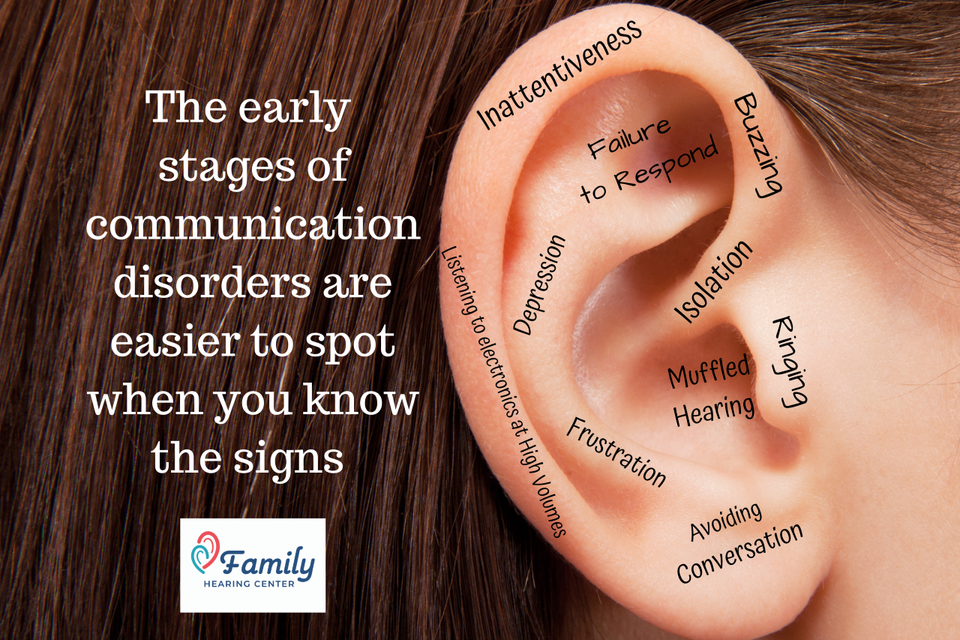
Tips & Resources on Hearing
For Wearers:
- It is recommended to wear the hearing aids all day. You should wear them just as much as you wear your glasses! Your body needs time to adapt to wearing hearing aids.
- Hearing Aids should not "whistle" or "ring" and they should never hurt. If ANY of these things are happening, contact us immediately.
- Expect a period of about 2-3 weeks to become acclimated to your hearing devices. Your body needs time to adapt to hearing "normal" sounds again, but turning everything on at once can be very overwhelming or even disturbing for many users.
For Family:
- When speaking to a hearing impaired person, always face them when you speak, and use eye contact.
- Do NOT cover your mouth because many hearing aid users depend on visual cues, "lip reading".
- If you must repeat, rephrase the words and do NOT raise your voice. It is not the volume of your voice that causes difficulty communicating, it is the specific tones that have suffered damage.
- Rephrasing a sentence gives them different words, helping them understand the context of your thought. If someone does not understand you saying, 'Let’s go eat," try saying something like, "I want to go eat dinner", or "I am getting hungry, what do you want to eat?"

Hearing Myths
MYTH: Hearing aids are for old people.
FACT: Many of our male clients 30 to 50 years old feel they are too young to have hearing problems; however, hearing loss can affect people of all ages.
MYTH: Hearing aids cannot fully correct your hearing loss.
FACT: Each individual patient has a unique loss and the treatment must be equally personalized for the best outcome.
MYTH: Consumers are often led to purchase overly expensive hearing devices.
FACT: Some people think that hearing specialists use terms like "digital" and "programmable" in order to create an impression of value in many hearing devices, taking advantage because the consumer is unable to tell the difference between one device and the next. This is not true. We always consider our client's needs before selecting a particular instrument, and it is always best to ask for a trial of any hearing device you may be interested in before you purchase, regardless of the price-point.
MYTH: Purchasing hearing aids from a website will save money.
FACT: The relationship between a patient and their hearing care provider is a lifelong one. Hearing devices require regular (quarterly or semi-annual) adjustments and maintenance. The cost for these services is typically bundled into the initial price of the hearing aid. Paying for these services separately can become VERY expensive, assuming a hearing care provider will service devices they did not sell.
FACT: Many of our male clients 30 to 50 years old feel they are too young to have hearing problems; however, hearing loss can affect people of all ages.
MYTH: Hearing aids cannot fully correct your hearing loss.
FACT: Each individual patient has a unique loss and the treatment must be equally personalized for the best outcome.
MYTH: Consumers are often led to purchase overly expensive hearing devices.
FACT: Some people think that hearing specialists use terms like "digital" and "programmable" in order to create an impression of value in many hearing devices, taking advantage because the consumer is unable to tell the difference between one device and the next. This is not true. We always consider our client's needs before selecting a particular instrument, and it is always best to ask for a trial of any hearing device you may be interested in before you purchase, regardless of the price-point.
MYTH: Purchasing hearing aids from a website will save money.
FACT: The relationship between a patient and their hearing care provider is a lifelong one. Hearing devices require regular (quarterly or semi-annual) adjustments and maintenance. The cost for these services is typically bundled into the initial price of the hearing aid. Paying for these services separately can become VERY expensive, assuming a hearing care provider will service devices they did not sell.
